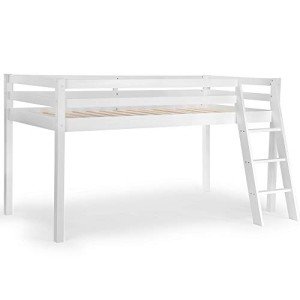10 Facts About Bunk Bed That Can Instantly Put You In An Optimistic Mood
A Comprehensive Guide to Children's Bunk Beds: Styles, Benefits, and Safety Considerations
Bunk beds have actually become a popular option for families looking to take full advantage of space and offer an enjoyable sleeping environment for children. With their unique design, they use a creative and useful service for shared bedrooms, playrooms, or even guest accommodation. This short article checks out the different styles of kids's bunk beds, their benefits, safety factors to consider, and responds to some often asked concerns.
The Allure of Bunk Beds
Children's bunk beds are more than just space-saving structures; they are also an entrance to adventurous dreams and imaginative play. Below is a comprehensive evaluation of their numerous advantages.
Benefits of Bunk Beds
- Space-Saving: Bunk beds effectively utilize vertical space, making them an ideal option for smaller sized rooms.
- Playful Design: Many bunk bed designs consist of slides, tents, and themed aspects, stimulating imagination and excitement.
- Partner Sharing: Bunk beds are ideal for brother or sisters sharing a room or accommodating pajama parties.
- Flexible Use: Some models can be separated into two private beds, using versatility as children grow.
- Storage Options: Many bunk beds come with integrated drawer storage or shelves, further improving their functionality.
Designs of Children's Bunk Beds
The variety of bunk beds offered today accommodates various preferences and requirements. Below is a summary of some popular designs.
Design
Description
Best For
Requirement Bunk Bed
A standard design including one bed stacked above another.
Brother or sisters sharing a room.
Loft Bed
Comparable to a bunk bed without the bottom bunk, allows for a workspace or play area below.
Restricted space for play/desk.
L-Shaped Bunk Bed
2 beds organized in an L-shape, often with additional areas for storage or play.
Distinct room designs.
Twin Over Full
A twin bed over a full bed, accommodating various sleep needs.
Growing children and teens.
High Sleeper
Stands even greater than a loft bed, usually featuring a desk or play area below.
Older kids needing more play/desk space.
Tent Bunk Bed
Bunk beds with a canopy or tent-like structure, creating a cozy, fun space.
Active and creative kids.
Key Features to Consider
When picking the ideal bunk bed for kids, the following features are worth thinking about:
- Material: Bunk beds can be made from wood, metal, or a combination. Each has its special visual and durability.
- Weight Capacity: Always verify the weight limitation of the bunk bed to ensure it can accommodate your children securely.
- Security Rails: Ensure the top bunk has sturdy rails to avoid falls.
- Ladder Security: A well-designed ladder needs to use simple and safe access to the upper bunk.
- Ending up: Ensure any finishes are non-toxic and safe for kids.
Safety Considerations
Security is critical when it comes to children's bunk beds. The following guidelines ought to be stuck to:
- Age Appropriateness: Generally, kids under six years of ages should not oversleep the upper bunk due to safety risks.
- Sturdy Construction: Ensure the frame and products are solid and can support the weight without drooping.
- Regular Maintenance: Periodically examine for loose screws, bolts, or other components that may need tightening up.
- Clear Play Area: Keep the area around the bunk bed complimentary of toys and obstacles to reduce tripping hazards.
Setting Rules for Safe Use
Establishing standards for bunk bed usage will assist guarantee safety:
- Limit Jumping and Climbing: Children ought to be encouraged versus leaping from the leading bunk and climbing on the sides.
- Monitoring Sleepovers: Monitor young guests while they are using the bunk bed for the first time.
- Inform on Ladder Use: Teach how to use the ladder safely, highlighting the significance of facing the ladder when climbing or down.
Regularly Asked Questions
1. What More hints is suitable for a kid to sleep in the leading bunk?
The majority of manufacturers advise that children ought to be at least 6 years old to sleep in the upper bunk. This guideline is developed to reduce the threat of falls.
2. Can bunk beds be customized?
Yes, lots of producers use personalized choices, consisting of colors, products, and additional features like drawers or desks.
3. Are bunk beds safe for weight?
Bunk beds have weight limitations, normally varying from 200 to 400 pounds, depending on the model and product. Constantly inspect the maker's requirements.
4. How do I maintain and clean a bunk bed?
Frequently look for loose parts, keep the bed tidy by wiping down surface areas, and ensure the bed linen is fresh to promote a safe and hygienic sleep environment.
5. Can bunk beds be separated into private beds?
Many bunk beds feature a choice to separate them into 2 private beds, providing long-term flexibility.
Kid's bunk beds are more than simple furniture; they are a functional, versatile, and creative component of a kid's room. With various styles available and many security factors to consider to remember, parents can pick the perfect bed that fits their space, meets their kids's needs, and imparts a sense of adventure. By comprehending Good Bunk Beds , designs, and security measures associated with bunk beds, households can produce a wonderful and protected sleeping environment for their kids. Whether for siblings sharing a room or space-saving solutions, bunk beds stay a beloved option for many homes.
